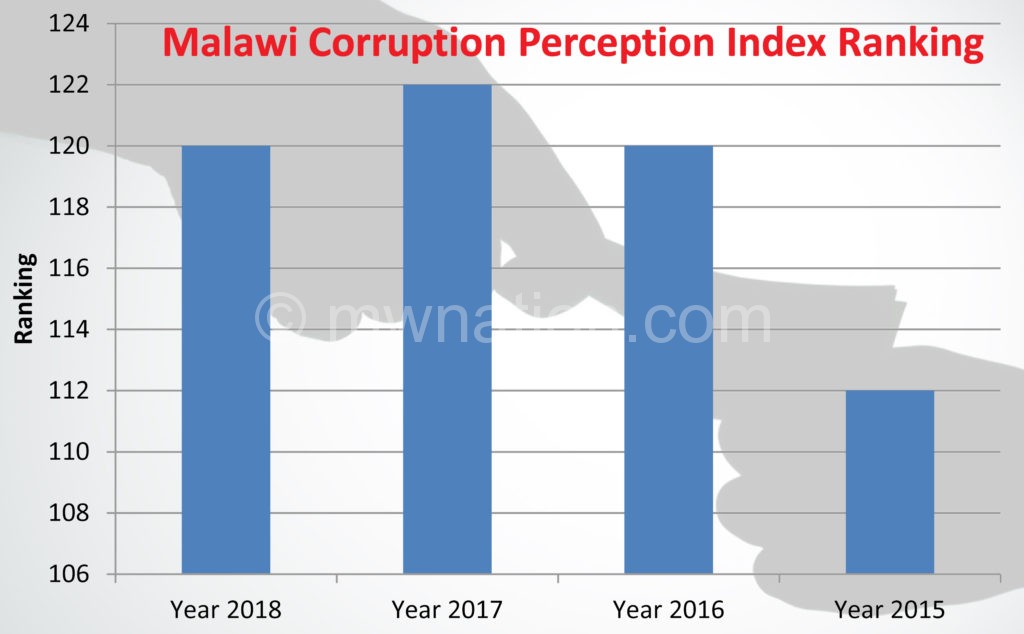Malawi creeps on corruption index
Malawi has made minor progress on the 2018 Transparency International (TI) Corruption Perception Index (CPI) which measures perceived levels of public sector corruption after scoring 32 points to move from position 122 in 2017 to 120.
While governance experts and business commentators say the results confirm growing corruption levels in the country and pose a threat to attracting new foreign direct investments (FDIs), Capital Hill is adamant that it is doing more to curb the vice.

The CPI report comes hot on the heels of the 2018 Mo Ibrahim Index of African Governance (IIAG) which also raised concerns on transparency and accountability. Malawi scored 38.3 percent, ranking 24 out 52 countries, with a deteriorating trend of -5.1 points.
Drawing on 13 surveys of business people and expert assessments, the CPI scores on a scale of zero (highly corrupt) to 100 (very clean). Thus, by scoring 32 points, Malawi is part of the sub-Saharan Africa which is the lowest scoring region on the index and failed to translate its anti-corruption commitments into meaningful progress.
Reads the report in part: “A region [sub-Saharan Africa] with stark political and socio-economic contrasts and longstanding challenges, many of its countries struggle with ineffective institutions and weak democratic values, which threaten anti-corruption efforts.”
In the report, Transparency International managing director Patricia Moreira has warned that corruption threatens democracy around the world.
Reacting to the survey yesterday, economist Gilbert Kachamba from Catholic University of Malawi slammed the laissez faire attitude in dealing with corruption in Malawi.
He said: “We have inefficient use of resources which may lead to stagnation on economic growth. For countries that are not doing well on corruption index, it is difficult for them to attract FDIs.
“With our efforts to reduce unemployment, especially that we are relying more on FDIs, if we are not dealing with corruption, no one will come to invest here.”
Kachamba said the country is doing well on paper with numerous strategies to deal with corruption, there is need to translate the strategies into action.
On his part, social and political commentator Rafiq Hajat said Malawi has fundamental flaws in the sense that it only boasts of strategies and legal frameworks.
He said: “We have selective application of the law. Institutions such as the Anti-Corruption Bureau [ACB] are not independent of political influence. They are also starved of funding.
“In the best case scenario, we will stagnate on these rankings, but the worst case scenario will see us sink very low like Venezuela or Zimbabwe. We need to deal with corruption now.”
In an earlier interview, governance expert Henry Chingaipe told our sister newspaper, Nation on Sunday, that the problem with Malawi is that anti-corruption strategies are developed for road shows presumably to hoodwink donors.
He said: “We are a very serious joke when it comes to fighting corruption. Words of mouth don’t fight corruption, it is action that does. Do you think in this country all these leaders have no idea on how to fight corruption? They indulge in corruption fully knowing that it is wrong.”
International law professor Dan Kuwali also said the country has over the years emphasised investigation and prosecution of corruption without rewarding public servants and whistle-blowers.
He said there is need to reward those that have manifested professionalism in their dealings.
“We need a reform of our institutions, capacity building of individuals and also the way we do things. We need a mindset change,” said Kuwali, a Brigadier General in the Malawi Defence Force.
In September last year, ACB director general Reyneck Matemba said all government ministries, departments and agencies (MDAs), especially those providing services, stink corruption.
He said: “We have a problem. But I think the first thing we have to do is to accept that we have a problem.
“If we continue denying, or remaining in a state of denial, then I think we are not doing a good job.”
But Minister of Information and Communications Technology Henry Mussa said it is not fair to blame government on the vice.
The minister’s sentiments echo what Mutharika said during the opening of the 2018/19 Budget Meeting of Parliament last May when he claimed that his administration is containing and reducing corruption.
He spoke against politicising corruption.
In July last year, our sister newspaper, Weekend Nation revealed that the fight against corruption is on its death bed as Capital Hill either cuts funding to key institutions or dithers to activate tools designed to strengthen the bodies.
The analysis of funding to key institutions in the graft fight since 2014, and a review of their legal and regulatory state, show a slack in support to theagencies.
National Integrity Platform national coordinator Jeff Kabondo said it cannot be claimed that that Malawi was improving in its fight against corruption. He said Malawi’s score may not realistically read as a significant measure of improvement.





